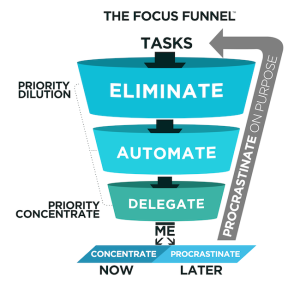I listened to an interesting podcast last week from, The Art of Charm, that was based on Rory Vaden’s book, Procrastinating on Purpose.” The premise of Rory’s book and this particular podcast episode broke down Rory’s book and his theory behind why procrastination can be a good thing. Now before you write this off for nonsense just hear me out. First we must define procrastination and understand that there’s a difference between procrastination and patience. Procrastinating for the purpose of avoiding an incomplete task or “inaction” is and will always be a terrible habit. Individuals who do this will fall behind in life and surely in business. Patience; however, can be defined as waiting to complete a task as to allow for better timing, more beneficial circumstances or a greater return on investment. Whenever we choose to make a decision or complete a task; we’re eliminating the possibility of concurrently making an infinite amount of other decisions. This is defined in economics as an opportunity cost. Stay with me. As a salesperson we face these critical moments every single day. Hundreds of times a day. In the form of mini productivity obstacles. Successful people, therefore, learn how to structure their time and categorize these mini productivity roadblocks according to 5 “focus funnel” stages according to Rory’s methodology. (See diagram below)  Eliminate: Here you must determine if a task has any value. When a task has little to no value you must choose to disregard it altogether, take action or put it aside for now and focus on your next task. Automate: Once you determine a task has value then decide if this said task can be automated. Take for instance a simple task that is tedious and time consuming. Before you continually tackle these tasks, day after day, establish an efficient system that may require a small investment of time today but will give you a greater return on time tomorrow. For example, a sales leader should establish a time management system where you only check your inbox at designated times during the day so you’re not becoming a slave to the bombardment of emails you receive throughout the day. Delegate:
Eliminate: Here you must determine if a task has any value. When a task has little to no value you must choose to disregard it altogether, take action or put it aside for now and focus on your next task. Automate: Once you determine a task has value then decide if this said task can be automated. Take for instance a simple task that is tedious and time consuming. Before you continually tackle these tasks, day after day, establish an efficient system that may require a small investment of time today but will give you a greater return on time tomorrow. For example, a sales leader should establish a time management system where you only check your inbox at designated times during the day so you’re not becoming a slave to the bombardment of emails you receive throughout the day. Delegate:  At this point if a task can neither be eliminated nor automated you must determine if the task can be delegated to someone else. An example of this is a C-Level executive spending copious amounts of their precious time answer customer service questions and/or low-value emails. By investing their time and money in hiring and/or training someone to complete these low-value tasks this sales leader will gain more time tomorrow for higher-value tasks by investing in a delegatory system today. Another example of delegation is a sales leader who’s initially following up with every inbound lead. A sales leader could delegate this to a business development representative. The sales leader will need to invest time initially to train the rep to know how to qualify leads. Once this system is in place then the sales leader will be able to follow-up with these qualified leads with a much higher closing probability. Rory defines this as the Money Value of Time (MVOT). Yes, hiring someone new and training them has an upfront investment of money and time. But, first consider your own value in terms of your salary. When you’re hung up on wasting precious time completing low-value tasks you cannot allocate your time to higher-value tasks. Leave these tedious, lower-value tasks to a trained employee whose pay is much more congruent with the time needed to complete them. This is a small investment today to allow for substantial gains tomorrow. Rory explains this further according to his “30x Rule”.
At this point if a task can neither be eliminated nor automated you must determine if the task can be delegated to someone else. An example of this is a C-Level executive spending copious amounts of their precious time answer customer service questions and/or low-value emails. By investing their time and money in hiring and/or training someone to complete these low-value tasks this sales leader will gain more time tomorrow for higher-value tasks by investing in a delegatory system today. Another example of delegation is a sales leader who’s initially following up with every inbound lead. A sales leader could delegate this to a business development representative. The sales leader will need to invest time initially to train the rep to know how to qualify leads. Once this system is in place then the sales leader will be able to follow-up with these qualified leads with a much higher closing probability. Rory defines this as the Money Value of Time (MVOT). Yes, hiring someone new and training them has an upfront investment of money and time. But, first consider your own value in terms of your salary. When you’re hung up on wasting precious time completing low-value tasks you cannot allocate your time to higher-value tasks. Leave these tedious, lower-value tasks to a trained employee whose pay is much more congruent with the time needed to complete them. This is a small investment today to allow for substantial gains tomorrow. Rory explains this further according to his “30x Rule”.
“The 30x rule When choosing to delegate a task, familiarize yourself with the 30x Rule. The 30x rule suggests that, in training someone else to do a task, it should take you 30x the amount of time it takes you to do the task once. For instance: for a task that takes you five minutes a day, the 30x rule dictates that you should spend 150 minutes training someone else to do it. Why does this make sense? It wouldn’t, unless you use the significance calculation: 5 minutes per day x 250 working days = 1,250 minutes per year. The question goes from “is it worth it to spend 150 minutes training someone to do something that takes me five?” to “is it worth it for me to spend 150 minutes to save myself 1,100 minutes in the long run?” This is similar to analyzing an investment — but the currency is time. You put in 150, and you get 1,100 back. This equates to a 733% ROTI (Return On Time Invested)! The way that wealthy people think about money is exactly the same way that multipliers think about time. You can spend that time and it’s gone forever, or you can invest that time and make more of it.”
Concentrate or Procrastinate: Here we’ve reached the bottom of the funnel (see above diagram). Choosing to “concentrate” means that you have determined the task is important and significant and you will tackle the task yourself in the here and now. Choosing to “procrastinate” at this stage means that you will either hold off on the task and send it through the funnel again at a more beneficial time or you’re willing create a system for delegation; making the time investment of training someone who can complete the task and save you valuable time tomorrow.
On of the best quotes I heard from Rory during the show was the following: “Your highest value to others is to be your highest self”
You must be honest with yourself. A majority of you over-achievers who are reading this want to take on everything that comes your way. What you might not realize; however, is that completing daily low-value tasks that should be eliminated, automated or delegated is hindering you from putting that precious time towards higher-value tasks that will give you the greatest return on your time invested. Hope you enjoyed this one! The greatest compliment you could give is commenting your feedback and/or sharing it with those who might find it useful as well! Show me some social love and follow me on Twitter! <>Max

